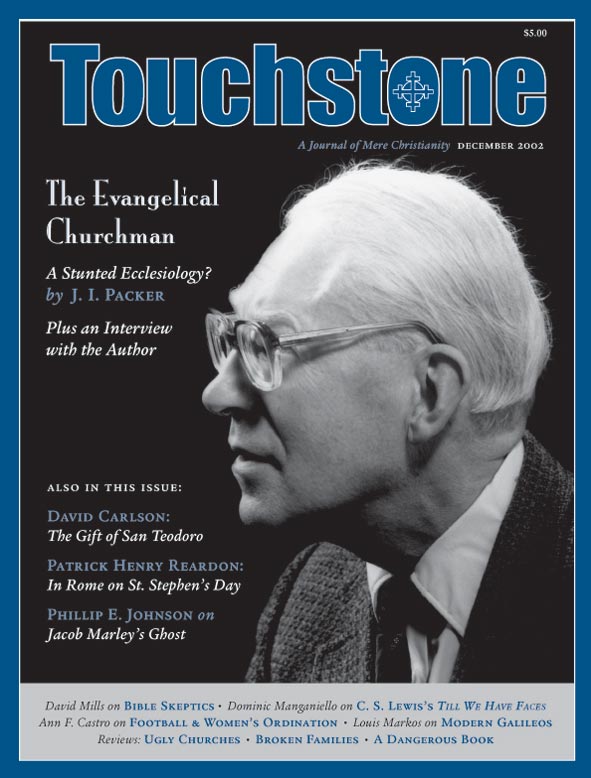Years of the Locust
Orthodox Christians of this generation are frequently accused of believing the Church has, in our lifetimes, seen better days. The progressives who supply this observation, along with the progress we resist, identify us as “traditionalists,” so placing us with the Jews who, rejecting the doctrine of God for the traditions of men, laid Christ upon the cross. They are rarely so incautious as to say directly that our fault is in failure to accept new doctrines and practices, for that too easily exposes the question of how what is new can be what the apostles taught, and from which St. Paul said we were not to deviate though encouraged by himself or an angel from heaven.
For our part, we tend to identify the innovators’ discoveries with mean, vulgar words like “heresy.” This causes great suffering among them and is loudly lamented, and by means of their lamentations, they seize the moral high ground in times when one needn’t prove the depravity of anyone who calls nice people bad names. (The innovator will always have a strong interest in Niceness. Because innovation always makes the first move—that is its definition and power—to deny it, one must of necessity be negative and reactionary, even when stating the obvious. To correct the progressive notion that white is black, someone must, in reactionary form, assert that black is black and white is white. This places him at a great disadvantage before an audience that likes progress and dislikes negativity.) The necessary dash of theological confusion is provided by making it appear that three or four advanced degrees and twenty years of arguing about Greek are necessary to raise a substantive question of whether the purveyors of new doctrines are denying what the apostles appear to teach, and what the churches have always, until now, thought they taught.
The plausibility of the “traditionalist” indictment lies in its partial truth. There are many among us old enough to remember a time when things were much better. When I was twenty (I am fifty now), no one could say that many Catholic seminaries were hotbeds of flagrant, aggressive homosexuality. Only clergy at the Unitarian edge of insanity would consider blessing a homosexual union. The archbishop of Canterbury was not a Druid. One could not be placed on trial in the Presbyterian or Episcopal churches for objecting to the ordination of women. Evangelical academics were not pressing for the use of inclusive-language Bibles on pain of being considered unevangelistic, nor were their students forced to use this language in their papers and discourse.
In those not so far-off days people were rarely, within the churches, barred from the ministry, persecuted in the seminaries, hissed at the lecterns, patronized as yokels, or branded as fanatics for believing, doing, and speaking as Christians always have. One looks back on them in the manner of those who recall the times before a totalitarian government came to power, or before the old neighborhood filled up with crack houses.
Life is worse today for people who don’t believe the Church has been wrong for two thousand years about the things our generation has been “fixing,” who dare to doubt that a great wave of enlightenment has swept over it in the last thirty years. It is worse because the faith and morals to which they hold are execrated not only in the popular media, but also in a great many churches. It is worse because they can no longer earn their bread in, or even participate in the life of, churches and religious institutions that were once open to them, which people who shared their now obsolete views built, endowed, and consecrated to divine service. It is worse because they cannot in good conscience attend or teach in schools, work for publishers or religious organizations, or belong to churches that demand from them, as a condition of participation or employment, departures from the faith and practice of just a single generation ago, doing this on the grounds either that new understandings of truth now govern the institution, or that no one connected with it must express themselves in such a way as to offend those who are walking in the new light.
The first bar to orthodox Christians that goes up when the revisionists gain control is not direct expulsion, but new rules that govern speech, writing, and worship, mandating that the whole community must use the language, follow the motions, and thus adopt the thought patterns, of egalitarianism, as though it were not only impolite but, because uncharitable, immoral not to do so. Handbooks and style manuals provide rules for speaking and writing, and so grounds for identification and discipline of those who resist. If the institution is a worshiping community, the ejection of the recalcitrant is accomplished by changing the symbols of worship, a major aspect of which is the introduction of women presbyters.
These profound alterations in the lex vivendi announce to orthodox Christians that they must change or leave. Because toleration for minority opinions is promoted until, but not after, the revisionists gain the necessary parliamentary majorities or key administrative posts, by the time the rules are changed, it is too late to resist—so one changes or leaves. Thus any meaningful opposition to egalitarianism within the institution is effectively done away with, and fundamental changes in theology are accomplished by forcing, under pain of being considered mean to women (but with the threat of discipline following resistance), peaceable co-existence with, and therefore capitulation to, egalitarian doctrines and practices.
The existence of these bars and penalties in the world of mainline religion is well known. No one needs to tell an Episcopalian or United Presbyterian that a believer thirty years behind the times need not apply unless he pretends to believe things that he doesn’t. (The conscience compromised in this way is easy to convert in time.) No one needs to inform the orthodox Catholic in many dioceses that he had best not approach his bishop’s advisory committees if he wishes to be a priest.
The battle against the Bible is now being fought with great vehemence by progressive Evangelicals, many of whom are in charge of the movement’s most influential institutions, who, while continuing to advertise and gather funds for their mission to bring Christ to the world, are in the process of changing the “Christ” they are bringing from the Son of God the Father to the Child of the God Who is Beyond Gender Categories, an operation that begins with removal of the theological significance of gender categories for language about human beings made in his image.
To this writer the most galling aspect of this essentially parasitic life is a strange interest in “mere Christianity,” or "ecumenical orthodoxy.” C. S. Lewis remains a patron saint of revisionist Evangelicals, but with his unfortunate sexism—as in their version of St. Paul—no longer of the essence. It is as though either man, had he known his own mind better, would eventually have followed the strongest threads of his thought to full enlightenment on these matters. Thus, ecumenically orthodox egalitarians may omit from their canon eccentricities like Lewis’s “Priestesses in the Church?” along with all those deuterocanonical observations about the nature of marital love in That Hideous Strength, Paul’s unfortunate (“difficult” seems to be the preferred term) wording of all those submission passages in his Epistles, and his incidental failure to advance women to the full and equal participation in the life of the Church that those who understand the mind of Christ more fully than he have belatedly awarded.
We of this generation who will not join this defection now find ourselves in our forties and fifties, and with a renewed urgency to inform those younger, in strong and unmistakable terms, about the theologically profound changes that have taken place, particularly in churches that make a point of professing orthodoxy, in the short span of years between our early and later adulthood. Our voices are almost completely silenced now in many places by institutional suppression, and death will soon enough finish the job. We need to leave a testament for those who, reading (even their freshly emasculated) Bibles and meditating on the history of the Church and the character of the Christian faith, begin to suspect that somewhere something in what they are now encouraged to accept as normal Christianity went very wrong.
S. M. Hutchens is a senior editor and longtime writer for Touchstone.
subscription options
Order
Print/Online Subscription

Get six issues (one year) of Touchstone PLUS full online access including pdf downloads for only $39.95. That's only $3.34 per month!
Order
Online Only
Subscription

Get a one-year full-access subscription to the Touchstone online archives for only $19.95. That's only $1.66 per month!
bulk subscriptions
Order Touchstone subscriptions in bulk and save $10 per sub! Each subscription includes 6 issues of Touchstone plus full online access to touchstonemag.com—including archives, videos, and pdf downloads of recent issues for only $29.95 each! Great for churches or study groups.
Transactions will be processed on a secure server.
more from the online archives
calling all readers
Please Donate
"There are magazines worth reading but few worth saving . . . Touchstone is just such a magazine."
—Alice von Hildebrand
"Here we do not concede one square millimeter of territory to falsehood, folly, contemporary sentimentality, or fashion. We speak the truth, and let God be our judge. . . . Touchstone is the one committedly Christian conservative journal."
—Anthony Esolen, Touchstone senior editor










